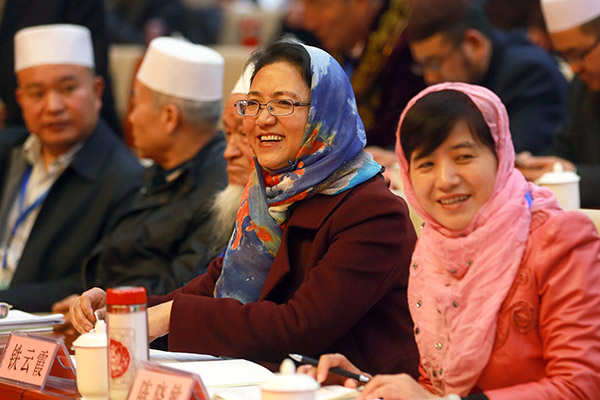
Delegates exchange views at the National Congress of the China Islamic Association on Nov 26 in Beijing.[Photo by Zou Hong/China Daily]
Religious extremism has started to spread into inland provincial areas from the Xinjiang Uygur autonomous region, according to China’s top religious affairs official, who urged the China Islamic Association to step up services for Muslim migrants and lead the fight against extremist thoughts.
Wang Zuo’an, head of the State Administration for Religious Affairs, said at the National Congress of the China Islamic Association on Nov 26 that the infiltration of extremist thoughts into the eastern and central areas deserves close attention.
“(The Islamic clergy) should stand in the front line in the fight to curb religious extremism … and put in time and energy to convert the mindset of those people influenced by extremist thoughts,” he said.
The association opened its three-day 10th National Congress on Nov 26, with members of the clergy convening in Beijing to elect new leadership and revise its constitution. More than 370 representatives from 31 provincial areas are taking part.
Wang said the association should use the internet to make clear the nature of the harm of extremism to Muslims. It should also encourage the use of popular Islamic readings to satisfy the religious demand of their congregations, and refute misinterpretation of the Quran, he said.
“We should let Muslims know the boundaries between legal and illegal religious activities, to enable them to say no to illegal activities,” he said.
The country has seen a growing trend of Muslims migrating from the west to eastern and central areas for the purposes of business, employment and study, he said.
“The association should help local Islamic associations provide religious services … and step up the training of local clergy,” which sometimes is in short supply, he said.
It should also target illegal publications and the spread of extremism through the internet.
Guo Chengzhen, vice-president and secretary-general of the association, said in a work report at the congress that the association should dig deep into doctrines and canons that are in line with social harmony and progress.
The interpretation of the Quran, and curbing the infiltration of extremist thought, will be a top priority for the association in the next five years, he said.
The association is also looking to develop ties with Islamic organizations in countries along the Belt and Road Initiative, and to establish platforms on bilateral cooperation and services, he said.
There are 26 countries with dominant Muslim populations along the initiative’s routes, and the association should conduct exchanges with international Islamic organizations and countries as the country pushes the initiative forward, Wang said.
China has a total Muslim population of more than 20 million and more than half live in the Xinjiang Uygur autonomous region, according to the national demographic census in 2010, the latest census of its kind.
Senior official calls for steady development of Chinese Islam
Highlights of a speech by Wang Zuo’an, chief of the State Administration for Religious Affairs, at the 10th National Congress of the China Islamic Assocation:
• We should respect the beliefs and customs of Muslims, and at the same time curb behaviors that intervene in administrative, judicial and education processes in the name of religious canons.
• The China Islamic Association should stick to and carry forward the fine traditions of Chinese Islam, correctly identify the various ideological trends of Islam overseas and avoid blindly following the lead of religions in other countries, which will only result in the loss of direction for Chinese Islam.
• The China Islamic Association should resolutely prohibit individual hajj pilgrims ... and protect the normal order of the hajj. Hajj-related work should be more transparent, and the association should further optimize the online application process and make public the use of hajj funds. Corruption in hajj-related areas should be punished in accordance with the law. The Islamic clergy should explain the hajj comprehensively and dialectically. The country’s number of hajj pilgrims (allowed to the Saudi Arabian city of Mecca) has already approached its limit, and there is not much room for more. We need to lead the Muslims to treat hajj more rationally, and object to irrational behaviors such as taking on debt to make the pilgrimage or making the pilgrimage in sickness.
• The China Islamic Association should understand the relationship between religious canons and the laws correctly, establish a firm concept of the rule of law and conduct activities within legal boundaries. It should learn to use the law to safeguard legal interests, instead of trying to solve problems through illegal actions such as creating disturbances.
